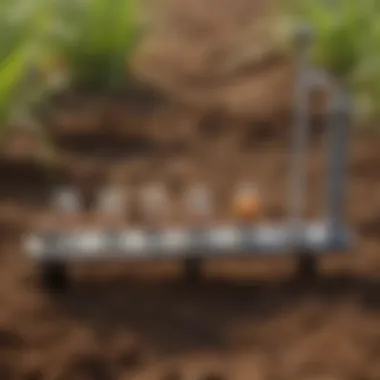Finding the Best pH Tester for Soil Health


Intro
In the realm of gardening and agriculture, understanding the intricate dance between soil composition and plant health is paramount. Among the plethora of tools available, a pH tester stands out as a crucial instrument for both seasoned farmers and budding enthusiasts. It not only unravels the mysteries held within the earth but also empowers gardeners to make informed decisions that can lead to lush harvests and thriving plants.
Whether you’re growing tomatoes in your backyard or managing a large-scale farm, knowing your soil's pH level is essential. It directly influences nutrient availability, microbial activity, and overall soil health. Now, before you dash off to grab a pH tester, let’s pause for a moment and delve into the world of soil pH testing. This guide will illuminate the nuances involved in selecting the right tool for your needs, stripping away the complexities and laying bare the vital information you require to get your hands dirty, quite literally.
So, what’s on the agenda? We’ll start with an overview of what soil pH is and why it holds such importance in the agricultural landscape.
Foreword to Soil pH Testing
Understanding soil pH testing is a cornerstone of effective gardening and agriculture. Soil pH tells us how acidic or alkaline our soil is, influencing everything from crop yields to nutrient availability. Without this knowledge, growers might as well be shooting in the dark.
When exploring the characteristics of your soil, pH testing undoubtedly stands out as a major player because it helps decipher the complex relationships between plants and their growing medium. For instance, a soil pH that’s too low can lead to nutrient lockout, making it hard for plants to absorb critical nutrients such as nitrogen and phosphorus. On the flip side, overly alkaline soils can also stunt plant growth.
Having the right pH tester will arm you with the knowledge to make educated interventions, ensuring you don’t inadvertently strangle your garden's potential.
Not all soil pH testers are created equal, and what works for one may not work for another. This article will delve into the many facets of choosing the correct pH tester, detailing its significance in cultivating your soil.
Why Test Soil pH?
Testing your soil’s pH opens the door to understanding its overall health. In fact, gardeners and farmers have long known that soil plays an instrumental role in their crops' vitality.
- Nutrient Interactions: First off, pH affects how nutrients interact. For example, iron availability declines as pH increases, which can lead to iron deficiency in plants.
- Microbial Activity: Microorganisms—those tiny critters working hard underground—are highly sensitive to pH levels. The right pH ensures they can thrive, ultimately aiding in nutrient breakdown and availability.
- Optimal Plant Growth: Different plants have varying preferences when it comes to soil pH. For instance, blueberries adore acidic soils (around 4.5 to 5.5), while most vegetables thrive best in neutral-to-slightly-acidic ranges (6.0 to 7.0).
"A well-chosen pH tester acts as your soil's best friend, guiding you toward a more fruitful harvest."
Importance of Soil pH
Understanding the role of soil pH is paramount for anyone engaged in gardening or agriculture. Soil pH is not just a number; it’s a reflection of the soil's ability to support plant life. Essentially, it determines the soil's acidity or alkalinity, which in turn influences various factors critical to plant health and growth.
To grasp why pH matters, consider that each plant species thrives within a specific pH range. Deviating from this range can lead to a plethora of issues including stunted growth, poor yield, and even plant death. Therefore, determining soil pH is not just a good practice—it's a necessity if one hopes to cultivate healthy plants.
The connection between soil pH and plant vitality can be likened to tuning a musical instrument. Just as each note requires a precise tuning for harmonious sound, each plant species requires a unique pH level to express its full genetic potential. For instance, a plant like blueberries favors acidic soils, with an ideal pH between 4.5 and 5.5, while asparagus thrive in more neutral conditions, ideally around 7.0.
Another crucial aspect to consider is the relationship between pH and nutrient availability in the soil. It’s been observed that certain nutrients become more or less accessible to plants depending on the soil's pH level. This interplay is vital; if the pH is too low or too high, essential nutrients like nitrogen, phosphorus, and potassium may become locked in the soil and unavailable to plants. To emphasize this point:
"A balanced soil pH is the cornerstone of nutrient uptake and plant growth."
Addressing soil pH requires a holistic approach. Those starting with soil testing should not view it as a one-time event but rather as a continuous process, adjusting as necessary based on seasons and crop rotations. Knowing your soil pH can inform decisions about fertilization, amendments, and crop selection, ensuring the garden or farm is a conducive environment for thriving plant life.
In summary, understanding soil pH is a multifaceted endeavor that encompasses plant growth, nutrient availability, and long-term soil health. Without grasping the nuances of how pH impacts these elements, gardeners and farmers may find themselves playing a losing game in the field.
Role of pH in Plant Growth
The efficacy of a plant's growth hinges significantly on soil pH. At its core, pH affects various physiological processes within the plant. An optimal pH levels aidsfunctions such as nutrient absorption, enzyme activity, and root development. Plants, much like people, prefer conditions where they can thrive. Having the right pH means that plants don't need to overextend themselves just to absorb the nutrients essential for their growth.
Here's how pH comes into play:
- Root Health: A soil pH that is too high or low can hinder root formation, leading to stunted growth. Roots are like the lifeline for plants; they absorb water and nutrients. If the roots struggle, so does the plant.
- Enzymatic Functions: Soil pH influences the enzyme activities crucial for metabolic processes. Most plants need a slightly acidic to neutral pH (between 6.0 and 7.0) for optimal enzyme activity.
- Stress Resistance: Plants grown in appropriate pH levels tend to exhibit greater resilience against environmental stressors, such as drought or disease.
In short, the right soil pH can make a world of difference in a plant's health and productivity.


Effects of pH on Nutrient Availability
Soil pH plays a pivotal role in determining how readily plants can access essential nutrients. Each nutrient has its own pH range for optimal uptake.
- Macronutrients: Elements like nitrogen, phosphorus, and potassium are often most available in a neutral pH. If your soil is too acidic or too alkaline, these nutrients may not be utilized efficiently by plants.
- Micronutrients: Essential micronutrients such as iron, manganese, and zinc become more accessible in slightly acidic soils but can become locked out in higher pH levels.
Understanding the implications of pH on nutrient availability can lead to better farming practices. Those looking to enhance their soil should routinely test pH levels and make adjustments where needed to provide crops with optimal conditions for nutrient absorption. Knowing the right conditions can spell success in agricultural endeavors.
Understanding pH Testers
When it comes to the realm of soil health, understanding pH testers is essential. Having a good grasp of how these devices function can drastically change your gardening or farming approach. Soil pH directly influences nutrient availability and biological activity, so knowing how to measure it accurately is crucial. The right pH tester not only helps in determining the soil's current condition but also guides decisions for necessary amendments. This section will help in demystifying the various types of pH testers available and how they fundamentally operate, setting a solid foundation for making a wise investment.
Types of pH Testers
A variety of pH testers can be found on the market, each varying in method and precision. They share a common goal but can differ sheepishly in their approach. Here's a closer look into three primary types of pH testers:
Digital pH Meters
Digital pH meters have gained popularity among users for their precision. These devices are often equipped with advanced electronics allowing for quick and accurate readings. A standout feature of these meters is their digital display that provides a straightforward and easy-to-read output. For those who appreciate convenience and efficiency, digital pH meters are a fantastic choice.
They can sometimes be a bit pricier than other types, but the accuracy they offer makes them worth the investment. Do note that they require regular calibration to maintain reliability, and sudden shock could lead to damage, so handling them with care is paramount.
pH Test Strips
On the other side of the spectrum lie pH test strips. These unassuming tools are notably user-friendly and quite affordable. They work by changing color when they come into contact with soil extract, helping you read the pH level. The ease of use makes them a preferred option for beginners or those who wish to do quick checks without the fuss of settings. However, the trade-off lies in their accuracy; they might not yield precise results every time, primarily due to reading errors associated with color interpretation. Still, they are excellent for general assessments.
Analog pH Meters
Finally, we have analog pH meters, also known as traditional meters. These instruments offer a hands-on experience and can be fairly straightforward to use. A key characteristic is the needle gauge, which reflects the pH level directly. While not as prevalent in the tech-savvy world of digital options, analog meters maintain a niche fan base. They’re usually more budget-friendly but might lack some precision compared to their digital counterparts. One must also be cautious about the maintenance of the electrode, as it can be prone to wear over time.
How pH Testers Work
Understanding how pH testers work is equally vital for grasping their value in soil management. At the core of these devices lies the ability to measure the concentration of hydrogen ions present in the soil. This concentration ultimately defines the soil's acidity or alkalinity. Digital and analog meters utilize electrodes to collect electrical signals that correspond to hydrogen ion concentration, while test strips rely on chemical reactions to produce a visible change.
Overall, the functionality of these tools intertwines with accurate readings, which can affect the crop growth and overall soil health. Whether you opt for digital, analog, or strips, knowing their mechanisms enables better decision-making.
"A well-informed gardener is a successful gardener. Knowing your tools is just as important as knowing your plants."
Exploring these three types of testers primes you for the next stage: understanding what to consider when buying one.
Where to Buy pH Testers
Knowing where to buy a pH tester is just as crucial as understanding how to use one. This decision can affect not only your immediate gardening needs but also your long-term agricultural outcomes. You need options that meet your specific needs. In a market flooded with products, it's easy to get lost in the choices. Here’s a breakdown of the most effective purchasing avenues you can explore.
Online Retailers
Purchasing your pH tester online offers you convenience and often competitive pricing. Here’s a closer look at some popular platforms:
Amazon
When it comes to online shopping, Amazon is arguably the go-to. With a vast selection of pH testers, it serves many gardeners with varied needs. You can find models ranging from budget-friendly options to professional-grade meters. One significant characteristic of Amazon is the range of customer reviews available, which can aid you in making an informed decision.
One unique feature is their Prime membership, which provides quick shipping options—perfect for those who need a tester urgently. However, be wary of the many products, as not all sellers on Amazon have the same level of quality. It’s essential to read the reviews thoroughly.


eBay
Another online option is eBay. Here, you can often snatch good deals on both new and used pH testers. The key characteristic of eBay is the bidding system, which can lead to lower prices for savvy shoppers. For those who enjoy a bit of a challenge, bidding can be quite a thrill.
However, it's important to check the seller's rating. Unlike Amazon, eBay doesn't always guarantee quality, and you may not always receive a return policy. Hence, diligent reading of product specifics is a must.
Specialized Gardening Websites
For someone who desires specialized knowledge, specialized gardening websites can be invaluable. These websites often provide pH testers that are curated for the gardening community. They might also come packed with articles about selection and usage, which can be quite helpful.
The major selling point of these sites is their focus on gardening. They often stock quality products tailored for specific gardening needs, which can be quite beneficial. For example, you can typically find devices that cater to unique plant ecosystems. However, keep in mind that prices might be higher compared to broader retail venues.
Local Agricultural Supply Stores
Sometimes, the best options lie closer to home. Visiting local agricultural supply stores can have its advantages. You get to see and even test the product before buying, which is a plus in your purchasing decision.
Farm Supply Stores
Farm supply stores often carry a variety of agricultural tools, including pH testers. What makes these stores favorable is their comprehensive customer service. Staff members usually have first-hand experience with the products they sell and can offer tailored recommendations based on your local soil conditions.
You also have the chance to build rapport with the employees, which can lead to insider tips on maintaining and calibrating your pH tester. The downside could be the limited selection as they might not carry all brands.
Nursery and Garden Centers
Nursery and garden centers are treasure troves for gardening enthusiasts. If you’re looking for a pH tester, these venues offer an array of plant-specific advice alongside their products. This means you can find testers that are directly aligned with particular plant types.
What sets them apart is their broadcasted expertise in gardening. Knowledgeable staff can assist you with usage queries and troubleshooting. However, again, the selection might not be comprehensive as you’d find online.
Specialized Retailers
Lastly, if you’re seeking top-tier options, look no further than specialized retailers.
Laboratory Equipment Suppliers
Laboratory equipment suppliers are less common for everyday shoppers but worth considering if you need precision-optimized pH testers. These suppliers often sell professional-grade equipment suitable for in-depth analysis, making them the best choice for intensive agricultural needs. Their products usually boast high reliability and accuracy, features that are invaluable in the agriculture industry.
The catch is that these products often come with a much higher price tag, limiting availability for hobbyists or casual gardeners.
Online Agricultural Stores
Online agricultural stores are also an option worth exploring. These sites focus specifically on farming equipment and often provide great insights into using these tools effectively. You can expect a good range, along with agricultural education resources, making it a practical choice.
They cater well to farmers and enthusiastic gardeners alike. But as with any online source, it's crucial to ensure their shipping policies align with your needs to avoid delays in your projects.
Factors to Consider When Buying
When it comes to selecting the right pH tester for soil, various factors demand your attention. These considerations can significantly influence your purchasing decision and ultimately affect how well you monitor and manage soil health.
Budget Considerations
First and foremost, think about your budget. The price range for pH testers can swing widely. Entry-level models may cost as little as $10, while high-end digital meters can reach prices over $200. Your choice should align with your gardening goals. If you are just nurturing a small vegetable garden, a basic model might do the trick. Conversely, if you're managing extensive agricultural land, investing in a more sophisticated, professional-grade tester could pay off in the long run. Always try to weigh the cost against the features you need.


Accuracy and Reliability
Next up, you must consider accuracy and reliability. Using an unreliable testing device can lead to soil management missteps. An accurate pH tester provides precise readings, allowing you to make informed decisions about fertilizers and amendments. Some products even have built-in calibration features to enhance accuracy. Look for those with positive user feedback regarding their reliability. A tester that consistently delivers trustworthy results can mean the difference between a flourishing garden and one that's struggling to thrive.
Ease of Use
The ease of use of a pH tester is another critical factor. For those who may not be particularly tech-savvy, the simpler the device, the better. Digital pH meters, for instance, often feature easy-to-read displays and straightforward operation. If you're frequently conducting tests, consider how quick and efficient your device is at delivering results. Test strips could be a good option too. They provide quick answers, but might not have the precision of a digital meter.
Calibration and Maintenance
Lastly, pay heed to calibration and maintenance. All pH testers require routine calibration to remain accurate over time. For example, digital meters often come with calibration solutions, so keep an eye out for models that include these upon purchase. Ensure you understand how often to calibrate and how to maintain your chosen device. A well-maintained tester will ensure reliable performance and longevity, saving you the hassle of frequent replacements.
In sum, understanding these factors helps not just in buying a pH tester but in extending its usability for your gardening and agricultural needs.
User Reviews and Recommendations
When it comes to making a wise purchase in the world of pH testers for soil, it�’s crucial to tap into the opinions of those who have already walked the path before you. User reviews and recommendations not only provide firsthand experiences, but they can also unveil what the specs and marketing materials might mask. Buyers often share their wins and setbacks, letting you in on the nitty-gritty details that can be critical when choosing your testing tool. Here, we’ll delve into the meaningful aspects of user feedback and where to clink your coffee cups with other gardening enthusiasts to gather invaluable insights.
Importance of User Feedback
User feedback can be seen as the heart and soul of modern shopping experiences. Many times, it’s the unfiltered accounts of other users that truly highlight the benefits and drawbacks of a specific pH tester. These reviews give a glimpse into real-world applications, showing how products perform in daily gardening tasks.
For example, let's say a particular digital pH meter is marketed as highly accurate, but user reviews may reveal inconsistencies in that accuracy under certain conditions. This candid discourse acts as a form of peer advice.
Moreover, feedback rounds up common concerns, from customer service experiences to ease of calibration. Knowing that others had a sticky situation with a company’s response can steer you towards making a more informed decision. Overall, user feedback connects you with the broader community, making it an invaluable part of your purchasing journey.
Where to Find Reviews
Online Forums and Communities
Online forums and communities have become sanctuaries for gardening aficionados seeking knowledge and camaraderie. These platforms, like those found on Reddit or specialized gardening sites, usually host discussions where members dive deep into their experiences with various pH testers. What sets these communities apart is their collaborative spirit.
Members are often more than willing to help a fellow gardener struggling to choose, sharing tips that might be hard to snag elsewhere. They might say, "Hey, I used Brand X last summer, and honestly, it didn’t hold up in the field like I thought it would!" This kind of grassroots sharing is what makes forums a popular choice for gathering honest feedback.
But there’s a flip side, too. Since many opinions are subjective, sifting through the comments is necessary. It’s also helpful to note how recent the discussions are; gardening tech may evolve, and advice from five years ago might not cut the mustard today.
Product Review Websites
Product review websites are designed specifically to offer an overview of different items, including pH testers. These sites often aggregate consumer ratings, so you can see the average score at a glance. Their structured layout allows for easy comparisons.
One standout feature is that such sites usually include pro-cons based on extensive tests. A website might state, "The YZ pH meter gives accurate readings but runs on batteries that deplete quickly," allowing consumers to weigh the good against the bad. Such analysis helps you to figure out if that irritating aspect is something you can live with or if it’s a deal-breaker.
However, sometimes these reviews can miss depth. They might not capture the personal anecdotes or community sentiment that make forums so vibrant. A general trend could emerge, but without the richer context, you may not get the full picture.
Ultimately, both options—online forums and product review websites—contribute significantly to your understanding of pH testers available in the market. Each has its own strengths and weaknesses, offering different insights that can guide you toward a well-informed purchase. By combining information from these sources, you put yourself in a better position to find the perfect pH tester tailored to your gardening needs.
The End
In wrapping up our dialogue about selecting the most suitable pH tester for your soil, it becomes clear that this topic is more than just a technical necessity; it's a gateway into the world of effective gardening and agricultural optimization. The soil's pH level profoundly influences plant health, nutrient availability, and overall crop yields. This article has underscored the critical elements you should contemplate before diving into a purchase.
When contemplating the right device, consider the accuracy and reliability of the meter. A trusty pH tester can be the difference between a flourishing garden and a lackluster plot of land. Not only does it provide immediate feedback—that’s crucial for any gardener aiming for the best yield—but it also helps in understanding the intricacies of soil composition over time.
Moreover, we talked about the budget considerations, which shouldn’t be overlooked. One might feel inclined to grab the cheapest option on the shelf, but it’s often worth it to invest a bit more for quality. User reviews and recommendations also play a pivotal role, offering real-world insights from fellow gardening enthusiasts. Finding reliable feedback from sources like Reddit can give you that extra boost of confidence before you make your final choice.
Lastly, ease of use and maintenance shouldn’t be brushed aside either. Whether you're a seasoned pro or a novice, a pH tester that’s user-friendly and requires minimal upkeep can save a lot of headaches down the road. Embrace the knowledge shared throughout this guide, and arm yourself with the right pH tester that aligns with your gardening vision.
"A good gardener knows the soil just as well as they know their plants. The right tools, including a reliable pH tester, can turn a simple garden into a fertile oasis."



